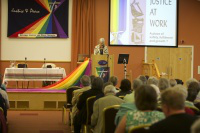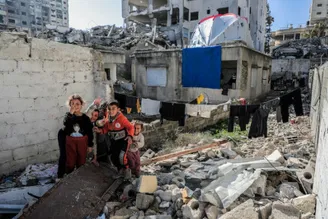Understanding church social action & justice networks – Thoughts from a lay woman

NJPN conference
I’ve been trying to unravel the complexities of the social action and justice structures in England and Wales. I know the National Justice and Peace Network (NJPN) very well – a 34-year-old network of diocesan contacts, caring agencies and religious which includes as part of its mission the addressing of poverty and social exclusion in England and Wales. It is a liaison body of the Catholic Bishops’ Conference of England and Wales (CBCEW). Then there is the Caritas Social Action Network (CSAN), which is the rapidly expanding agency of the CBCEW promoting social action in England and Wales. Have the acronyms lost you already? Well the scene is certainly getting more complicated.
Of course, anyone active in NJPN is going to be delighted that CSAN is fully resourced and supported by the bishops. Why wouldn’t we? CSAN emerged out of the Catholic Agency for Social Concern (CASC), whose foundation was rooted in a recommendation made at the annual national Justice and Peace Conference of 1988. Held in Liverpool and with a focus on home poverty – who could ever forget the scalding stories of social exclusion from women of Bootle – the concluding plenary session recommended that the bishops consider setting up a home version of CAFOD, their existing agency which focused on international poverty. Bishop James O’Brien, who attended, took the recommendation back to the bishops’ conference and a process was set in motion. Seven years later Anne Forbes was appointed in 1995 to get the new national Catholic agency of CASC going.
An active member of Leeds Diocesan Justice and Peace (J&P) Commission, Anne brought in NJPN and the religious orders as two of the six primary stakeholders, on an equal footing with Catholic organisations assisting the vulnerable in the UK, such as the SVP. Advocacy and challenging structural injustice were key elements of CASC’s work, alongside social action. I remember a CASC day conference on ‘Women in Prison’ which used the pastoral cycle process, so beloved of J&P groups, to look at women’s experience, analyse the factors behind their insensitive treatment, reflect theologically and then plan advocacy and further action on their behalf. The agency brought concerns related to UK poverty and injustice into the heart of the bishops’ conference and NJPN members were enthusiastic collaborators. After Anne Forbes left CASC in 2001, more Catholic welfare agencies linked into its work. By the time it changed its name to Caritas Social Action in 2003 it was identifying itself as a national umbrella for Catholic organisations involved in social action in Britain. NJPN, with its broader and global mission, seemed less of a partner than the service organisations.
Yet, the realisation that CSAN is now regarded by the CBCEW as a structure completely independent of the national NJPN structure in England and Wales came rather as a bolt out of the blue two weeks ago. It was the day a new job was advertised for Westminster Diocese – ‘Director of Caritas’. You see the job came as a complete surprise. Those of us involved with Westminster J&P for at least 25 years, including the setting up of a J&P commission 11 years ago, would have expected to know this job was to be advertised or consulted about the job description or terms. None of us had heard of the ‘Caritas Westminster Advisory Board’, the line managers for the post, and a visit to the Westminster website did not mention its existence or provide information on the membership. We now know that the eventual Caritas Westminster office will also have an Administrator, a Fieldworker and a Secretary – a very substantial financial commitment by the diocese.
The Chair of Westminster’s Caritas Board has shown a creditable willingness to fill in the information gaps when asked. Yet, I for one continue to be bothered, and I feel the disquiet being murmured in dark corners of the diocese, and indeed across England and Wales, about the CSAN structures being set up nationally and locally needs to be brought out into the light.
A new story is being told. This story goes that it was the papal visit of 2010 that has spurred the Church in England and Wales to create “a new culture of social responsibility”. Addressing a CSAN Conference at Liverpool’s Hope University in February 2011, Archbishop Vincent Nichols said “we will be engaging in a programme to enable the Catholic community to contribute as fully as possible to the new culture of social responsibility called for by Pope Benedict XVI and by the Prime Minister in his farewell speech at the end of the papal visit”. The conference, Archbishop Nichols said, was the first step in this programme.
Whilst being delighted to hear these words, I want to remind that there is an older story. Social action responses to poverty in Britain have been every bit as bottom up as they have been top down and they have been underway long before 2010. Poverty in Britain in one form or another has been a constant thread of concern at all of NJPN’s 33 annual conferences, years before the Bishops made their commitment to setting up significant Caritas Social Action structures at diocesan and national level. This concern has been taken up by diocesan J&P in initiatives over the years such as poverty hearings and advocacy for refugees in Britain, in liaison with UK organisations such as Church Action on Poverty and Housing Justice.
My point is, let us acknowledge the grassroots commitment to justice that hundreds of ordinary Catholics have committed decades of their lives to, and the role vulnerable communities themselves have played in building up a consensus for social change over decades.
My second point concerns the distinction between Charity and Justice. Any serious focus on poverty must have these two dimensions - the action that will remedy immediate need, plus identifying the unjust structures that give rise to poverty. It comes down to the ‘two feet’ of social action – direct social services and social change or, put more simply, charity and justice. Just looking at their websites, diocesan Caritas bodies appear to focus more on charity, and the various ministries underway as part of this are excellent. However, if Justice is underplayed then the transformation necessary to identify structural sin and to tackle the causes of poverty is unlikely. More than that, we are not being faithful to the imperatives of Catholic Social Teaching to build social justice and solidarity. Social Justice Formation and advocacy training will need to be a part of this, but I can’t see that this is part of the remit of CSAN and Caritas Westminster. If NJPN or any other group is going to fill this gap then they will need substantial resourcing from the CBCEW as well.
My third point is about resourcing of J&P fieldworkers more generally. Could it be that with the CBCEW stepping up resourcing for the new Caritas structures, particularly at diocesan level, that NJPN and diocesan J&P workers could lose the voice and resources they currently have, which are already very limited. It seems to depend entirely on diocesan bishops. In Salford, for example, when the last J&P fieldworker left his post several years ago he was not replaced, while Caritas Salford, as part of the CSAN network, was given every support by the diocesan bishop. Only half a dozen dioceses have full-time paid J&P fieldworkers anyway because so little money is given by the church to this mission, and all J&P activists must be wondering if their mission is valued at all by the hierarchy. I’ve been told the money had to be found to offer generous salaries because Caritas Westminster seeks “high-calibre” people to apply for the ‘Caritas Director’ post. I’m afraid I have an allergy to incorporating the language and approach of the corporate world! And I’ll point out the salary on offer is double that of any J&P worker in the country, which is profoundly unjust. And it’s so hard to feedback concerns to the CBCEW and feel you are heard. No bishop now attends the annual meetings between NJPN and the Bishops’ Conference, as used to happen. But that seems to be a reality for other groups in the church too who have consultative or liaison status with the CBCEW.
Linked to this is my fourth point, that NJPN covers Peace and Care for Creation which are issues outside the CSAN remit. Pax Christi does all the ground work for Peace Sunday and promotes peace education but it relies very much on its own members and the NJPN to get its materials and training information out to parishes and schools. In fact, General Secretary Pat Gaffney spoke at the last NJPN quarterly meeting in Leicester during February about the ‘100 Days of Peace’ initiative in the lead-up to the London Olympics. As for Care for Creation, several initiatives to get a structure underway to link this issue into the CBCEW have yet to prove really effective. During the papal visit the British government and the Vatican agreed to collaborate over Climate Change, so there is an imperative there. CAFOD gives attention to environmental issues, but NJPN’s environment working group is crucial as well. Two annual NJPN conferences focusing on Environment (2005) and Food (2010) and involving around 350 participants each have been ground-breaking in linking faith, environment and action for sustainable development, and last April NJPN’s key contacts spent a day studying Creation Theology. There has been some impact - the new Westminster Diocese Environmental Mission leaflet is a shining example – but the CBCEW could give more attention to addressing environmental justice more seriously. NJPN is filling a gap here and needs more resources to keep up its networking and support for groups addressing the whole spectrum of justice, peace and the integrity of creation. Vital too is NJPN’s role in making connections between issues, for example highlighting links between global climate change, expenditure on war, and migration issues in England and Wales.
It is very heartening to know that NJPN’s Chair, Anne Peacey, and CSAN’s Chief Executive, Helen O’Brien, have been in regular contact and making every effort to work together. Several organisations, such as Housing Justice and the Jesuit Refugee Service, are attached to both networks. The key issue seems to be that the CBCEW needs to set up a process to help clarify the social action and justice structures in England and Wales and how they can work together to build God’s kingdom. The structures cannot be kept entirely separate, as has been suggested by some bishops, and indeed work for the common good needs common endeavour. NJPN and CAFOD collaborate closely, particularly diocesan level workers, and surely this can happen with CSAN? The ‘Living Wage’ campaign is an initiative where this is already happening.
The deadline for applications for Westminster’s ‘Caritas Director’ post is up tomorrow, so this is an urgent matter.
And surely, raising awareness of Catholic Social Teaching and organising social justice formation is part of the strategy of NJPN, CSAN, CAFOD, the National Board of Catholic Women, and a number of other Catholic agencies, consultative bodies and liaison bodies of the CBCEW. Yes, let’s work to further build “a new culture of social responsibility” in England and Wales, but let’s do it together for the common good.
Ellen Teague is a member of the Columban Justice, Peace and Integrity of Creation Team in Britain.
USEFUL LINKS:
National Justice and Peace Network - www.justice-and-peace.org.uk
Caritas Social Action Network - www.caritas-socialaction.org.uk
Columbans UK - www.columbans.co.uk


















